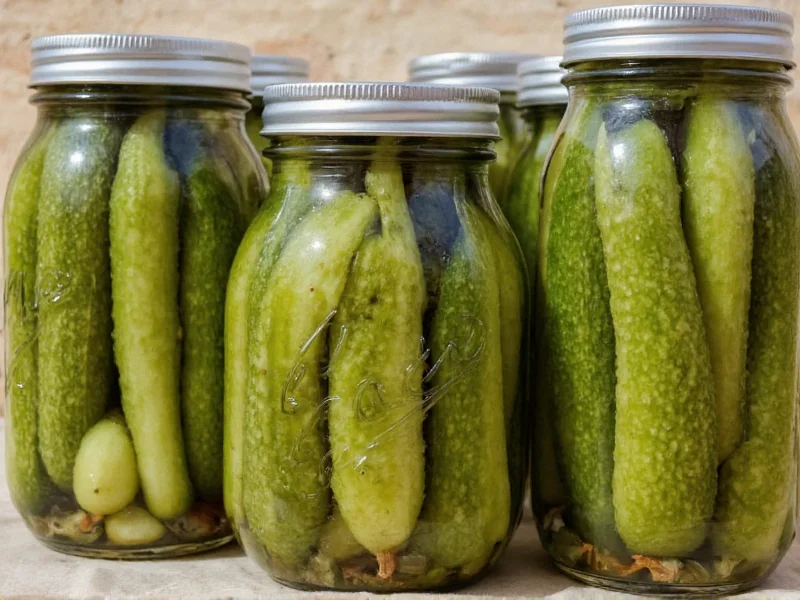When you ask are dill pickles fermented, the answer isn't as straightforward as you might think. Understanding the difference between traditional fermented dill pickles and modern vinegar-based versions is crucial for anyone interested in food preparation, gut health, or simply knowing what's in their pantry.
The Traditional Fermentation Process for Dill Pickles
True fermented dill pickles, often called "half-sour" or "full-sour" depending on fermentation time, undergo a natural lacto-fermentation process. This traditional method involves:
- Submerging fresh cucumbers in a saltwater brine (typically 3-5% salt solution)
- Adding fresh dill, garlic, and other spices
- Allowing natural bacteria (primarily Leuconostoc mesenteroides and Lactobacillus plantarum) to convert cucumber sugars into lactic acid
- Storing at room temperature for 1-6 weeks depending on desired sourness
During this process, beneficial lactic acid bacteria proliferate while creating an acidic environment that preserves the cucumbers and develops the characteristic tangy flavor. This natural fermentation creates probiotics that support gut health - a key difference between are fermented pickles good for you versus vinegar-based alternatives.
Modern Commercial Dill Pickles: The Vinegar Reality
Most dill pickles you find in grocery stores are not fermented at all. Instead, they're produced through a quick-process method called "fresh packing" that involves:
- Placing cucumbers directly into jars with dill and spices
- Pouring a solution of vinegar, water, and salt over them
- Processing in a hot water bath to seal the jars
This method creates pickles in days rather than weeks, meeting consumer demand for immediate availability. The resulting product has the dill flavor profile but lacks the probiotic benefits of true fermentation. When wondering why aren't all pickles fermented, the answer lies in commercial production efficiency and shelf stability requirements.
How to Identify Truly Fermented Dill Pickles
Telling the difference between fermented and vinegar-based dill pickles requires careful label examination. Look for these indicators:
| Feature | Fermented Dill Pickles | Vinegar-Based Dill Pickles |
|---|---|---|
| Primary Preservation Method | Lactic acid from fermentation | Vinegar (acetic acid) |
| Labeling Clues | "Naturally fermented," "lacto-fermented," "contains live cultures" | "Vinegar," "acetic acid" in ingredients |
| Refrigeration Requirement | Always refrigerated (even before opening) | Sold on room-temperature shelves |
| Shelf Life After Opening | 2-3 months refrigerated | 6-12 months refrigerated |
| Probiotic Content | Contains live beneficial bacteria | No live cultures (vinegar kills bacteria) |
Health Implications: Fermented vs. Vinegar Pickles
The difference between fermented and vinegar pickles extends beyond just taste. Fermented dill pickles offer several potential health advantages:
- Probiotics: Contain live beneficial bacteria that support gut microbiome diversity
- Digestive enzymes: Naturally produced during fermentation aid digestion
- Vitamin development: Fermentation can increase certain B vitamins
- Lower glycemic impact: The fermentation process modifies carbohydrates
Vinegar-based pickles still provide some benefits like being low-calorie and containing vinegar's potential blood sugar regulation properties, but they lack the probiotic advantages of traditionally fermented varieties. When considering are fermented pickles better for gut health, research suggests yes - the live cultures in fermented pickles contribute to a healthier digestive system.
Common Misconceptions About Dill Pickles
Several myths persist about dill pickles and fermentation:
- Misconception: All sour-tasting pickles are fermented
Reality: Vinegar creates immediate sourness without fermentation - Misconception: "Dill" refers to the preservation method
Reality: "Dill" only indicates the use of dill weed as a flavoring - Misconception: Refrigerated pickles are always fermented
Reality: Many vinegar-based pickles are refrigerated for quality, not because they're fermented
Making Your Own Fermented Dill Pickles
If you're interested in experiencing authentic fermented dill pickles, making them at home is surprisingly simple. You'll need:
- Fresh, unwaxed cucumbers (Kirby variety works best)
- Non-iodized salt (pickling or kosher salt)
- Fresh dill, garlic, and optional spices (mustard seeds, peppercorns)
- Chlorine-free water
- Glass jars with fermentation lids or airlock systems
The process takes about 2-6 weeks at room temperature, followed by refrigeration to slow fermentation. Home fermentation allows you to control ingredients and create truly probiotic-rich pickles - perfect for those asking how to make fermented dill pickles at home.











 浙公网安备
33010002000092号
浙公网安备
33010002000092号 浙B2-20120091-4
浙B2-20120091-4